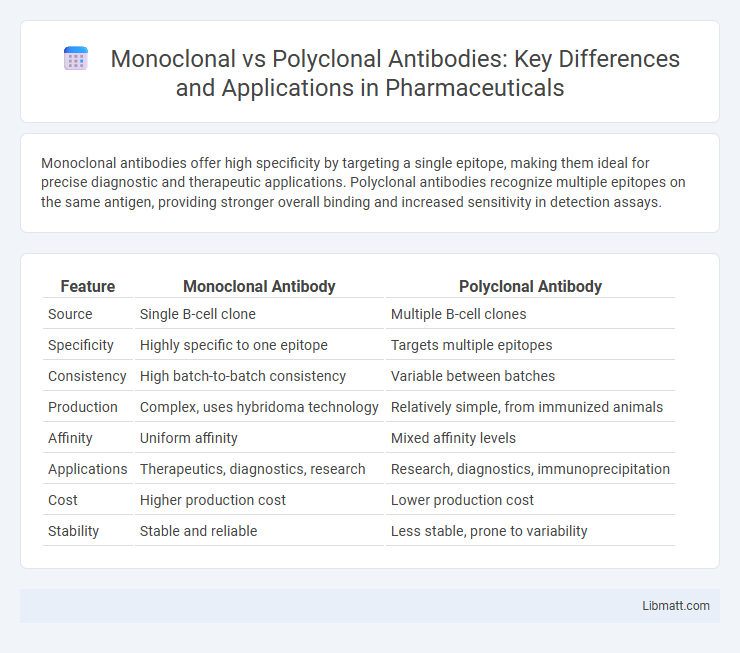Monoclonal antibodies offer high specificity by targeting a single epitope, making them ideal for precise diagnostic and therapeutic applications. Polyclonal antibodies recognize multiple epitopes on the same antigen, providing stronger overall binding and increased sensitivity in detection assays.
Table of Comparison
| Feature | Monoclonal Antibody | Polyclonal Antibody |
|---|---|---|
| Source | Single B-cell clone | Multiple B-cell clones |
| Specificity | Highly specific to one epitope | Targets multiple epitopes |
| Consistency | High batch-to-batch consistency | Variable between batches |
| Production | Complex, uses hybridoma technology | Relatively simple, from immunized animals |
| Affinity | Uniform affinity | Mixed affinity levels |
| Applications | Therapeutics, diagnostics, research | Research, diagnostics, immunoprecipitation |
| Cost | Higher production cost | Lower production cost |
| Stability | Stable and reliable | Less stable, prone to variability |
Introduction to Antibodies
Antibodies are proteins produced by the immune system to identify and neutralize foreign substances like pathogens. Monoclonal antibodies are derived from a single clone of B cells, offering specificity against one unique epitope, while polyclonal antibodies consist of a mixture of immunoglobulins that recognize multiple epitopes on the same antigen. Your choice between monoclonal and polyclonal antibodies depends on the need for either precise targeting or broader detection in applications such as diagnostics and therapeutics.
What Are Monoclonal Antibodies?
Monoclonal antibodies are lab-produced molecules engineered to serve as substitute antibodies that specifically bind to a single epitope of an antigen. These antibodies originate from a single clone of B cells, ensuring uniformity and high specificity, which makes them invaluable for targeted therapy and diagnostic applications. Understanding what monoclonal antibodies are can enhance your ability to select precise immunological tools for research or treatment.
What Are Polyclonal Antibodies?
Polyclonal antibodies are a diverse mixture of immunoglobulin molecules secreted by different B cell clones in response to an antigen, recognizing multiple epitopes on the same target. They are commonly used in research and diagnostic applications for their ability to detect a broader range of antigenic sites, offering higher sensitivity compared to monoclonal antibodies. Your choice of polyclonal antibodies can enhance assay performance when detecting complex or variable antigens.
Production Methods: Monoclonal vs Polyclonal
Monoclonal antibodies are produced using hybridoma technology, where a single B-cell is fused with a myeloma cell to create a clone that secretes identical antibodies. Polyclonal antibodies are generated by immunizing animals and collecting the serum, which contains a mixture of antibodies targeting multiple epitopes of the antigen. Understanding these production methods helps you select the appropriate antibody type for specific research or therapeutic applications.
Structural Differences Between Monoclonal and Polyclonal Antibodies
Monoclonal antibodies consist of identical immunoglobulin molecules originating from a single B-cell clone, resulting in uniform specificity for a single epitope on an antigen. In contrast, polyclonal antibodies comprise a heterogeneous mixture of immunoglobulin molecules produced by multiple B-cell clones, targeting multiple epitopes on the same antigen. Structurally, monoclonal antibodies have consistent variable regions, whereas polyclonal antibodies exhibit diverse variable regions reflecting their multi-epitope recognition.
Specificity and Sensitivity Comparison
Monoclonal antibodies exhibit high specificity by targeting a single epitope, reducing cross-reactivity and enhancing precision in diagnostic or therapeutic applications. Polyclonal antibodies, recognizing multiple epitopes on the same antigen, often provide greater sensitivity due to their ability to amplify the detection signal. Your choice between the two depends on whether specificity or sensitivity is paramount for your experimental or clinical needs.
Applications in Research and Diagnostics
Monoclonal antibodies provide high specificity for identifying single epitopes, making them ideal for diagnostic assays such as ELISA, flow cytometry, and immunohistochemistry in cancer research and infectious disease detection. Polyclonal antibodies, recognizing multiple epitopes, offer robust detection sensitivity useful in applications like Western blotting, immunoprecipitation, and antigen capture in complex biological samples. The choice between monoclonal and polyclonal antibodies directly impacts the accuracy, reproducibility, and sensitivity of research and diagnostic outcomes.
Therapeutic Uses in Medicine
Monoclonal antibodies offer precise targeting of specific antigens, making them highly effective in cancer immunotherapy, autoimmune disease treatment, and infectious disease management. Polyclonal antibodies provide broad immune response support, useful for diagnostic applications and neutralizing toxins or pathogens in various therapeutic settings. Your choice between monoclonal and polyclonal antibodies depends on the required specificity, production consistency, and therapeutic goals in medicine.
Advantages and Limitations of Each Type
Monoclonal antibodies offer high specificity and consistency due to their origin from a single B-cell clone, making them ideal for diagnostic and therapeutic applications, but their production is complex and costly. Polyclonal antibodies provide robust detection by recognizing multiple epitopes on an antigen, enhancing sensitivity, yet they have batch-to-batch variability and lower specificity, which can lead to cross-reactivity. Selecting between monoclonal and polyclonal antibodies depends on the required precision, reproducibility, and production feasibility for research or clinical use.
How to Choose: Monoclonal or Polyclonal Antibody
Choosing between monoclonal and polyclonal antibodies depends on your specific research needs and application. Monoclonal antibodies offer high specificity by targeting a single epitope, ideal for reproducibility in diagnostic tests, while polyclonal antibodies provide broader epitope recognition, enhancing sensitivity in detecting proteins with multiple antigenic sites. Evaluate the required specificity, consistency, and target protein complexity to determine which antibody type best suits your experimental goals.
Monoclonal Antibody vs Polyclonal Antibody Infographic

 libmatt.com
libmatt.com